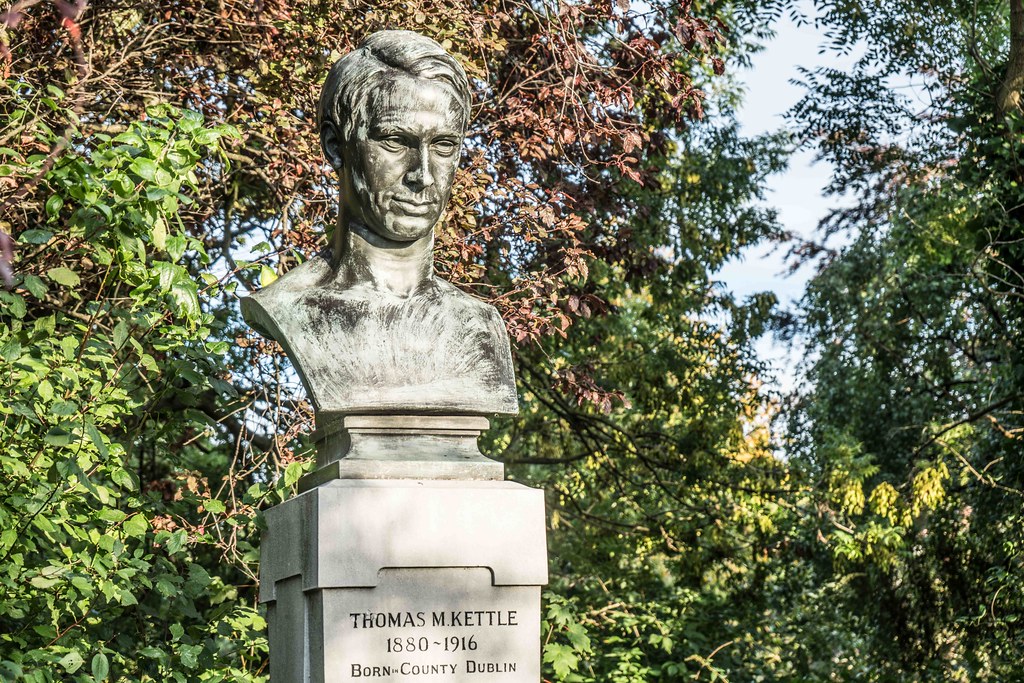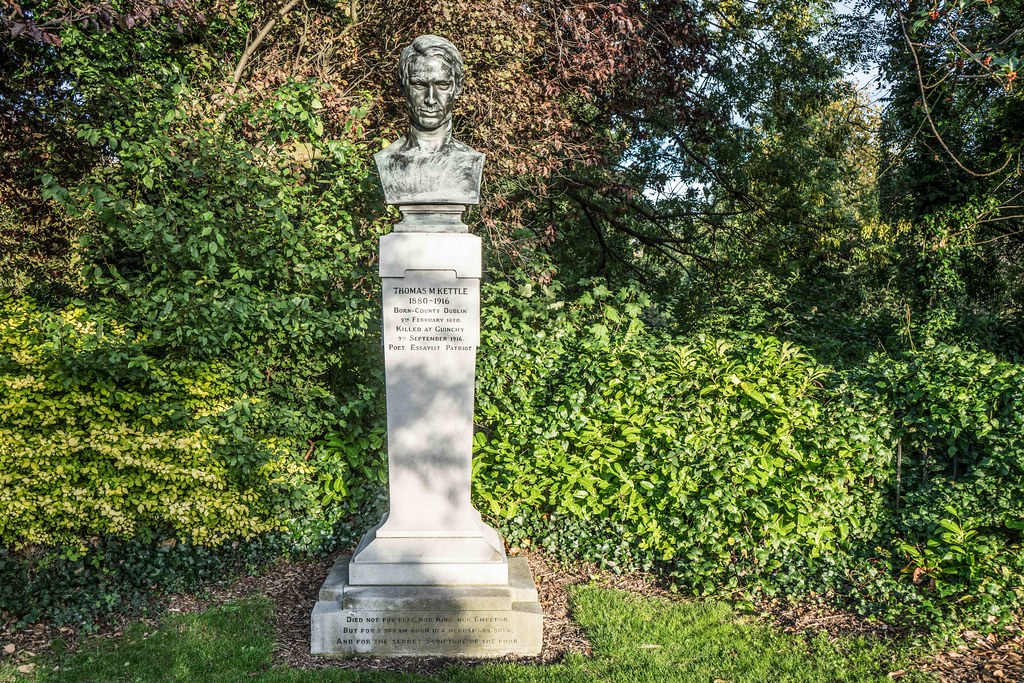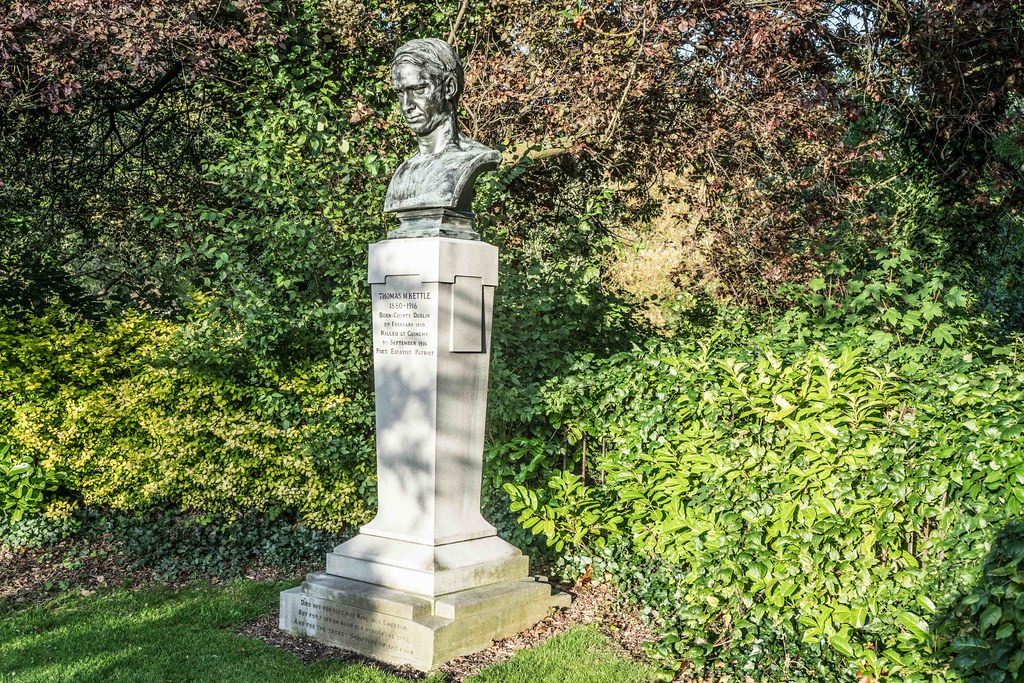THOMAS KETTLE IN STEPHEN’S GREEN
Thomas Michael "Tom" Kettle (9 February 1880 – 9 September 1916) was an Irish economist, journalist, barrister, writer, poet, soldier and Home Rule politician. As a member of the Irish Parliamentary Party, he was Member of Parliament (MP) for East Tyrone from 1906 to 1910 at Westminster. He joined the Irish Volunteers in 1913, then on the outbreak of World War I in 1914 enlisted for service in an Irish regiment where in 1916 he was killed on the Western Front. He was a much admired old comrade of James Joyce, whom considered him to be his best friend in Ireland, as well as the likes of Francis Sheehy-Skeffington, Oliver St. John Gogarty and Robert Wilson Lynd.
An attempt to erect a commemorative portrait bust of Kettle was beset by controversy due to historical debate until it was finally placed, albeit without official unveiling, in St. Stephen's Green. His name is inscribed on the Thiepval Memorial in France, a stone tablet commemorates him in the Island of Ireland Peace Park, Messines, Belgium, and he is listed on the bronze plaque in the Four Courts Dublin which commemorates the 26 Irish barristers killed in the Great War.
The Literary and Historical Society (University College Dublin) have historically held an annual wreath-laying ceremony at the bust in St. Stephen's Green.
The recently established UCD Economics Society have also named their life membership award in memory of Thomas Kettle. Notable recipients include Irish Central Bank Governor Patrick Honohan and Economist David McWilliams
The 153rd session of the Literary and Historical Society UCD remembering their fallen auditor At the time of his death a beautiful tribute to him appeared in the French journal L'Opinion:
“All parties bowed in sorrow over his grave, for in the last analysis they were all Irish, and they knew that in losing him, whether he was friend or enemy, they had lost a true son of Ireland. A son of Ireland? He was more. He was Ireland! He had fought for all the aspirations of his race, for Independence, for Home Rule, for the Celtic Renaissance, for a United Ireland, for the eternal Cause of Humanity . . . He died, a hero in the uniform of a British soldier, because he knew that the faults of a period or of a man should not prevail against the cause of right or liberty.”
An attempt to erect a commemorative portrait bust of Kettle was beset by controversy due to historical debate until it was finally placed, albeit without official unveiling, in St. Stephen's Green. His name is inscribed on the Thiepval Memorial in France, a stone tablet commemorates him in the Island of Ireland Peace Park, Messines, Belgium, and he is listed on the bronze plaque in the Four Courts Dublin which commemorates the 26 Irish barristers killed in the Great War.
The Literary and Historical Society (University College Dublin) have historically held an annual wreath-laying ceremony at the bust in St. Stephen's Green.
The recently established UCD Economics Society have also named their life membership award in memory of Thomas Kettle. Notable recipients include Irish Central Bank Governor Patrick Honohan and Economist David McWilliams
The 153rd session of the Literary and Historical Society UCD remembering their fallen auditor At the time of his death a beautiful tribute to him appeared in the French journal L'Opinion:
“All parties bowed in sorrow over his grave, for in the last analysis they were all Irish, and they knew that in losing him, whether he was friend or enemy, they had lost a true son of Ireland. A son of Ireland? He was more. He was Ireland! He had fought for all the aspirations of his race, for Independence, for Home Rule, for the Celtic Renaissance, for a United Ireland, for the eternal Cause of Humanity . . . He died, a hero in the uniform of a British soldier, because he knew that the faults of a period or of a man should not prevail against the cause of right or liberty.”
- BATTLE OF THE CUSTOM HOUSE
- DEMOLITION DAVE IN SMITHFIELD
- ROBERT EMMET
- COUNTESS MARKIEVICZ - STEPHEN’S GREEN
- THOMAS KETTLE - STEPHEN’S GREEN
- JAMES JOYCE - ST. STEPHEN’S GREEN
- BATTLE OF MOUNT STREET
- WELLINGTON MONUMENT IN PHOENIX PARK
- NATIONAL WAR MEMORIAL AND GARDENS
- BENJAMIN LEE GUINNESS
- VERONICA GUERIN
- BRENDAN BEHAN - BANK OF THE ROYAL CANAL
- THE SPECIAL OLYMPICS - DUBLIN CASTLE
- JAMES CLARENCE MANGAN - STEPHEN’S GREEN
- RABINDRANATH TAGORE - STEPHEN’S GREEN
- O’DONOVAN ROSSA
SORRY FOR THE DELAY


